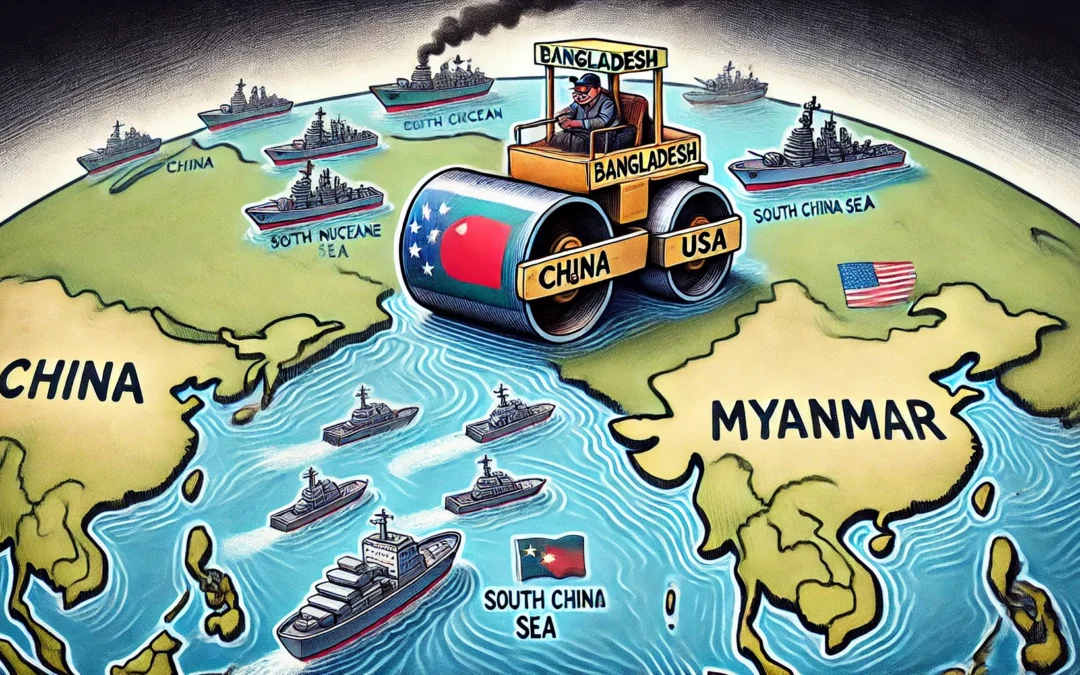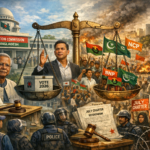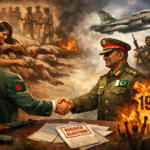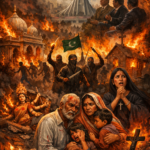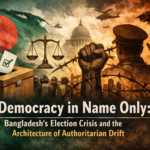Bangladesh, a nation founded on the principles of secularism, democracy, and a deep yearning for freedom from exploitation, has experienced a complex and intriguing evolution in its political, social, and economic spheres over the past few decades. The country’s journey from a war-torn, poverty-stricken nation to a rising star in South Asia’s economic and political landscape is a testament to its resilience. Among the most fascinating elements in the unfolding story of Bangladesh is the so-called ‘nuance revolution,’ a phenomenon that seems loosely tied to the radical Islamist group Hizb ut-Tahrir, suspiciously aligned with Jamaat-e-Islami, and associated, ironically, with Nobel Laureate Professor Muhammad Yunus.
This blog seeks to delve deeply into the complexities surrounding the emergence of this new ruling class, their ideological alliances, the role of deep state actors, and the potential future implications for Bangladesh. Through a critical analysis, we explore the present state of the country, the historical roots of these political movements, and how they could shape the nation’s trajectory moving forward, sparking concern and thoughtful consideration among our readers.
### Historical Context: The Rise of Islamist Politics in Bangladesh
Before dissecting the present-day situation, it is essential to understand the historical background that laid the groundwork for Islamist politics in Bangladesh. When Bangladesh gained independence from Pakistan in 1971, it emerged as a secular state led by the Awami League under Sheikh Mujibur Rahman. The birth of the nation was soaked in blood, with its people rejecting the Islamist political agenda of Pakistan. However, the secular fabric of the country began to unravel soon after the assassination of Sheikh Mujibur Rahman in 1975. Military regimes and political instability gave rise to the influence of Islamist parties such as Jamaat-e-Islami and radical groups like Hizb ut-Tahrir.
Jamaat-e-Islami, a party that had initially opposed the independence of Bangladesh and sided with the Pakistani army during the liberation war, made its way back into the mainstream political scene during the military rule of General Ziaur Rahman. Over time, the party aligned itself with the center-right Bangladesh Nationalist Party (BNP) and became a formidable force in the political arena, even holding key ministerial positions during various coalition governments.
On the other hand, Hizb ut-Tahrir, an international Islamist organization that seeks to establish a global Islamic caliphate, began its operations in Bangladesh in the early 2000s. Although officially banned in 2009, the group’s influence and network have remained significant, particularly among educated young professionals and students.
### Hizb ut-Tahrir’s Shadowy Influence and the Emergence of the
“Nuance Revolution”
Hizb ut-Tahrir has been a controversial player in Bangladesh’s political landscape, known for its underground operations and its goal of establishing an Islamic state governed by Sharia law. The group’s messaging primarily targets disillusioned youth, intellectuals, and professionals who are frustrated with the corruption and dysfunction of mainstream political parties. This, in part, has led to what some have termed the “nuance revolution”—a subtle, often unnoticed shift in the ideological landscape that blends modernity with conservative Islamist values.
Despite being banned, Hizb ut-Tahrir continues to operate under various guises, and its influence remains particularly strong in elite educational institutions such as Dhaka University and Bangladesh University of Engineering and Technology (BUET). The group’s appeal lies in its intellectual discourse that critiques the failures of the state, the capitalist system, and Western influence. It provides an alternative narrative that, while not overtly violent, calls for a radical overhaul of the system through non-participation in elections and civil disobedience.
However, this “nuance revolution” is far from being an isolated grassroots movement. It is widely suspected that elements of Bangladesh’s non governmental deep state—shadowy networks are either passively allowing or actively facilitating the growth of Hizb ut-Tahrir’s influence. The rationale for this could be linked to internal power struggles within the ruling elite, where certain factions seek to undermine the current government by promoting instability and ideological division.
### The Suspicious Alignment with Jamaat-e-Islami
While Hizb ut-Tahrir operates in the shadows, Jamaat-e-Islami is a more established player in the political landscape of Bangladesh. The party’s involvement in the ‘1971 genocide ‘, a brutal campaign of mass killings and atrocities during the Bangladesh Liberation War, continues to cast a long shadow. Over the years, Jamaat has managed to rebrand itself as a legitimate political entity. Despite its dwindling electoral fortunes in recent times, Jamaat remains a potent force in influencing conservative voters, particularly in rural areas.
There have been increasing suspicions that the so-called “nuance revolution” has been covertly aligned with Jamaat-e-Islami’s broader goals of establishing an Islamic state. Jamaat’s strategy has always involved working within the democratic framework to achieve its objectives, unlike Hizb ut-Tahrir, which advocates for the outright rejection of democracy. Yet, the ideological overlap between these two groups—both of which envision a Bangladesh governed by Islamic principles—cannot be ignored.
One of the most contentious questions in this debate is whether there is a deliberate effort by certain elements within the state machinery to facilitate the growth of both Hizb ut-Tahrir and Jamaat-e-Islami as a counterbalance to the ‘secular and moderate Islamist factions’ currently in power. By this, we refer to political entities that, while rooted in Islamic principles, do not advocate for the establishment of an Islamic state. Given the history of military involvement in politics and the deep state’s propensity to manipulate political actors for its own ends, such a theory cannot be entirely dismissed.
### The Curious Case of Professor Muhammad Yunus: From Development Icon to Political Pawn?
The mention of Nobel Laureate Professor Muhammad Yunus in this context may come as a surprise to many. Widely celebrated for his pioneering work in microfinance and the establishment of Grameen Bank, Yunus has long been regarded as a global champion for poverty alleviation and social entrepreneurship. However, in recent years, Yunus has found himself at odds with the Bangladeshi government, particularly with Prime Minister Sheikh Hasina, who accused him of meddling in politics and harboring ambitions of establishing a technocratic government.
While Yunus’s public persona is that of a development icon, there is a growing perception in some quarters that he may be playing a more insidious role in Bangladesh’s political dynamics. His connections with Western elites, including powerful figures in the U.S. government, have led to speculation that Yunus could be part of a broader geopolitical game aimed at destabilizing the current regime. The notion of Yunus as the “American blue-eyed boy” is not entirely unfounded, as he enjoys significant support from international organizations and foreign governments, particularly in the West.
Critics argue that Yunus’s brand of microfinance, while successful in certain contexts, has also led to the further marginalization of the poorest segments of society. The high interest rates charged by microfinance institutions and the debt traps that many borrowers find themselves in have led some to question whether Yunus’s model truly benefits the masses or merely serves to perpetuate cycles of poverty. This critique has fueled suspicions that Yunus, in his pursuit of global recognition and influence, may be willing to align himself with forces that seek to undermine Bangladesh’s current political structure.
### The Present-Day State of Affairs: A New Ruling Class in the Making?
At present, Bangladesh stands at a crossroads. The ruling Awami League, under Prime Minister Sheikh Hasina, continues to dominate the political scene, but cracks are beginning to show. Accusations of authoritarianism, human rights abuses, and corruption have tarnished the government’s image, both domestically and internationally. Meanwhile, the opposition BNP remains fragmented and weakened, and Jamaat-e-Islami, though officially banned from electoral politics, retains a loyal base of supporters.
In this context, the so-called “nuance revolution” presents a unique challenge. The rise of Islamist ideologies, combined with the disillusionment of the youth and intellectuals, suggests that Bangladesh could be on the brink of a significant ideological shift. This new ruling class, comprising elements of the deep state, radical Islamists, and technocrats like Professor Yunus, could potentially steer the country in a direction that veers away from its secular foundations.
What makes this situation even more complex is the role of external actors, particularly the United States. With its strategic interests in the region, Washington has been known to support figures who align with its geopolitical objectives. Professor Yunus, with his international clout and connections, could very well be the linchpin in a broader American strategy to reshape Bangladesh’s political landscape.
### Future Implications: Toward an Islamist Technocracy?
The future of Bangladesh is far from certain, but several scenarios emerge from the current state of affairs. One possibility is that the so-called “nuance revolution” continues to gain momentum, leading to the emergence of an Islamist technocracy. In this scenario, the deep state could facilitate the rise of a government that combines Islamic principles with technocratic governance, potentially with figures like Professor Yunus playing a key role in legitimizing this new order on the international stage.
Another possibility is that the growing influence of Islamist groups could lead to greater social unrest, particularly as the country grapples with rising inequality, corruption, and environmental challenges. This could result in a period of prolonged instability, with various factions vying for control of the state.
Finally, there is the risk that Bangladesh could become a battleground for external powers, with the United States, China all seeking to influence the country’s future trajectory. In this context, the role of deep state actors and Islamist groups could become even more pronounced, as they seek to capitalize on the shifting geopolitical landscape.
### Conclusion: Navigating the Complexities of Bangladesh’s Political Future
The so-called “nuance revolution” in Bangladesh represents a complex and multifaceted challenge
for the country’s future. The rise of Islamist ideologies, the role of deep state actors, and the curious involvement of figures like Professor Yunus all point to a shifting political landscape that could have profound implications for the nation’s future.
As Bangladesh moves forward, it must grapple with these competing forces while striving to maintain its commitment to secularism, democracy, and inclusive development. The road ahead will not be easy, but the choices made in the coming years will shape the future of this vibrant and resilient nation.

